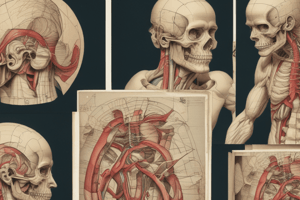Podcast
Questions and Answers
Which of the following tracts decussate?
Which of the following tracts decussate?
- Vestibulospinal tracts
- Reticulospinal tracts
- Rubrospinal tracts (correct)
- All of the above
The reticulospinal tract originates in the medulla.
The reticulospinal tract originates in the medulla.
False (B)
What is the primary function of the vestibulospinal tracts?
What is the primary function of the vestibulospinal tracts?
Control balance and posture
The __________ tract coordinates movements of the head in relation to visual stimuli.
The __________ tract coordinates movements of the head in relation to visual stimuli.
Match each extrapyramidal tract with its function:
Match each extrapyramidal tract with its function:
Which tract is known to facilitate voluntary movements?
Which tract is known to facilitate voluntary movements?
The rubrospinal tract provides ipsilateral innervation.
The rubrospinal tract provides ipsilateral innervation.
From which part of the brainstem do the vestibulospinal tracts arise?
From which part of the brainstem do the vestibulospinal tracts arise?
Flashcards are hidden until you start studying
Study Notes
Extrapyramidal Tracts
- Originates in the brainstem, transmitting motor fibers to the spinal cord.
- Responsible for involuntary and automatic control of musculature: muscle tone, balance, posture, and locomotion.
- Comprises four tracts: vestibulospinal, reticulospinal, rubrospinal, and tectospinal.
- Vestibulospinal and reticulospinal tracts provide ipsilateral innervation, while rubrospinal and tectospinal tracts provide contralateral innervation.
Vestibulospinal Tracts
- Includes two pathways: medial and lateral, originating from vestibular nuclei.
- Vestibular nuclei receive input from balance organs, conveying this information to the spinal cord ipsilaterally.
- Controls balance and posture by innervating 'anti-gravity' muscles: arm flexors and leg extensors, via lower motor neurons.
Reticulospinal Tracts
- Consists of medial and lateral reticulospinal tracts with distinct functions.
- Medial reticulospinal tract arises from the pons, facilitating voluntary movements and increasing muscle tone.
- Lateral reticulospinal tract originates from the medulla, inhibiting voluntary movements and reducing muscle tone.
Rubrospinal Tracts
- Originates from the red nucleus in the midbrain, with fibers decussating before descending into the spinal cord, resulting in contralateral innervation.
- Function is not fully understood but is believed to be involved in the fine control of hand movements.
Tectospinal Tracts
- Begins at the superior colliculus of the midbrain, which receives input from the optic nerves.
- Neurons decussate quickly before entering the spinal cord, terminating at cervical levels.
- Coordinates head movements in response to visual stimuli.
Studying That Suits You
Use AI to generate personalized quizzes and flashcards to suit your learning preferences.




